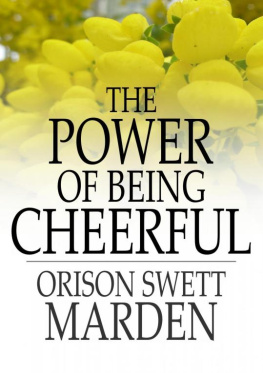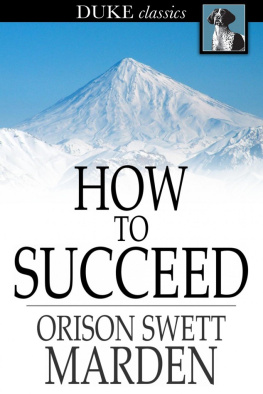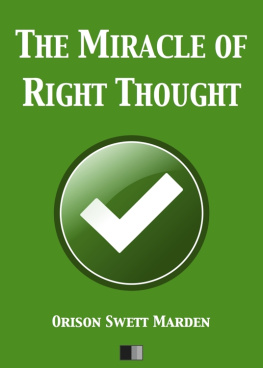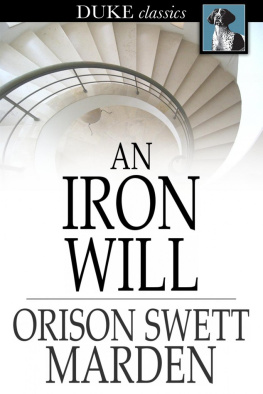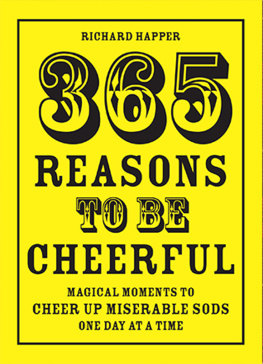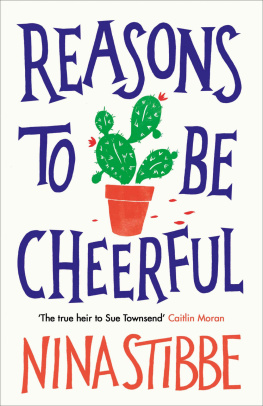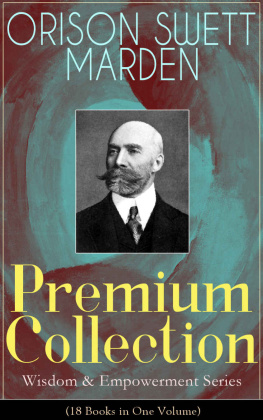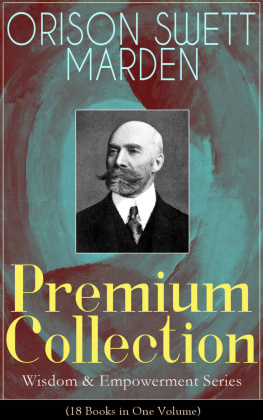Marden - The Power of Being Cheerful
Here you can read online Marden - The Power of Being Cheerful full text of the book (entire story) in english for free. Download pdf and epub, get meaning, cover and reviews about this ebook. City: Waiheke Island, year: 2009, publisher: The Floating Press, genre: Science. Description of the work, (preface) as well as reviews are available. Best literature library LitArk.com created for fans of good reading and offers a wide selection of genres:
Romance novel
Science fiction
Adventure
Detective
Science
History
Home and family
Prose
Art
Politics
Computer
Non-fiction
Religion
Business
Children
Humor
Choose a favorite category and find really read worthwhile books. Enjoy immersion in the world of imagination, feel the emotions of the characters or learn something new for yourself, make an fascinating discovery.
- Book:The Power of Being Cheerful
- Author:
- Publisher:The Floating Press
- Genre:
- Year:2009
- City:Waiheke Island
- Rating:3 / 5
- Favourites:Add to favourites
- Your mark:
- 60
- 1
- 2
- 3
- 4
- 5
The Power of Being Cheerful: summary, description and annotation
We offer to read an annotation, description, summary or preface (depends on what the author of the book "The Power of Being Cheerful" wrote himself). If you haven't found the necessary information about the book — write in the comments, we will try to find it.
The Power of Being Cheerful — read online for free the complete book (whole text) full work
Below is the text of the book, divided by pages. System saving the place of the last page read, allows you to conveniently read the book "The Power of Being Cheerful" online for free, without having to search again every time where you left off. Put a bookmark, and you can go to the page where you finished reading at any time.
Font size:
Interval:
Bookmark:
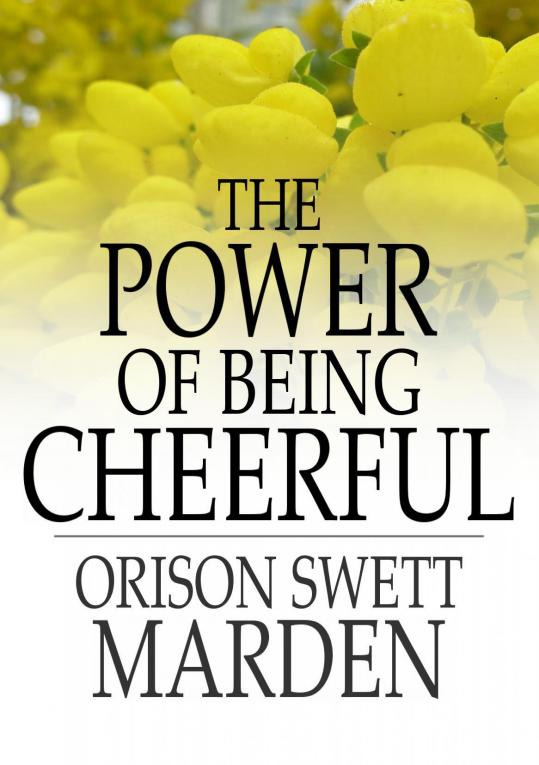

The Power of Being Cheerful
From a 1899 edition.
ISBN 978-1-775413-83-7
2009 THE FLOATING PRESS.
While every effort has been used to ensure the accuracy and reliability of the information contained in The Floating Press edition of this book, The Floating Press does not assume liability or responsibility for any errors or omissions in this book. The Floating Press does not accept responsibility for loss suffered as a result of reliance upon the accuracy or currency of information contained in this book. Do not use while operating a motor vehicle or heavy equipment. Many suitcases look alike.
Visit www.thefloatingpress.com
The soul-consuming and friction-wearing tendency of this hurrying,grasping, competing age is the excuse for this booklet. Is it not anabsolute necessity to get rid of all irritants, of everything whichworries and frets, and which brings discord into so many lives?Cheerfulness has a wonderful lubricating power. It lengthens the life ofhuman machinery, as lubricants lengthen the life of inert machinery.Life's delicate bearings should not be carelessly ground away for merelack of oil. What is needed is a habit of cheerfulness, to enjoy everyday as we go along; not to fret and stew all the week, and then expectto make up for it Sunday or on some holiday. It is not a question ofmirth so much as of cheerfulness; not alone that which accompanieslaughter, but serenity,a calm, sweet soul-contentment and inwardpeace. Are there not multitudes of people who have the "blues," who yetwish well to their neighbors? They would say kind words and make theworld happierbut they "haven't the time." To lead them to look on thesunny side of things, and to take a little time every day to speakpleasant words, is the message of the hour.
THE AUTHOR.
William K. Vanderbilt, when he last visited Constantinople, one dayinvited Coquelin the elder, so celebrated for his powers as a mimic, whohappened to be in the city at the time, to give a private recital onboard his yacht, lying in the Bosphorus. Coquelin spoke three of hismonologues. A few days afterwards Coquelin received the followingmemorandum from the millionaire:
"You have brought tears to our eyes and laughter to our hearts. Sinceall philosophers are agreed that laughing is preferable to weeping, youraccount with me stands thus:
"For tears, six times... $600
"For laughter, twelve times .. $2,400
$3,000
"Kindly acknowledge receipt of enclosed check."
"I find nonsense singularly refreshing," said Talleyrand. There is goodphilosophy in the saying, "Laugh and grow fat." If everybody knew thepower of laughter as a health tonic and life prolonger the tinge ofsadness which now clouds the American face would largely disappear, andmany physicians would find their occupation gone.
The power of laughter was given us to serve a wise purpose in oureconomy. It is Nature's device for exercising the internal organs andgiving us pleasure at the same time.
Laughter begins in the lungs and diaphragm, setting the liver, stomach,and other internal organs into a quick, jelly-like vibration, whichgives a pleasant sensation and exercise, almost equal to that ofhorseback riding. During digestion, the movements of the stomach aresimilar to churning. Every time you take a full breath, or when youcachinnate well, the diaphragm descends and gives the stomach an extrasqueeze and shakes it. Frequent laughing sets the stomach to dancing,hurrying up the digestive process. The heart beats faster, and sends theblood bounding through the body. "There is not," says Dr. Green, "oneremotest corner or little inlet of the minute blood-vessels of the humanbody that does not feel some wavelet from the convulsions occasioned bya good hearty laugh." In medical terms, it stimulates the vasomotorcenters, and the spasmodic contraction of the blood-vessels causes theblood to flow quickly. Laughter accelerates the respiration, and giveswarmth and glow to the whole system. It brightens the eye, increases theperspiration, expands the chest, forces the poisoned air from theleast-used lung cells, and tends to restore that exquisite poise orbalance which we call health, which results from the harmonious actionof all the functions of the body. This delicate poise, which may bedestroyed by a sleepless night, a piece of bad news, by grief oranxiety, is often wholly restored by a good hearty laugh.
There is, therefore, sound sense in the caption,"Cheerfulness as aLife Power,"relating as it does to the physical life, as well as themental and moral; and what we may call
THE LAUGH CURE
is based upon principles recognized as sound by the medicalprofessionso literally true is the Hebrew proverb that "a merry heartdoeth good like a medicine."
"Mirth is God's medicine," said Dr. Oliver Wendell Holmes; "everybodyought to bathe in it. Grim care, moroseness, anxiety,all the rust oflife,ought to be scoured off by the oil of mirth." Elsewhere he says:"If you are making choice of a physician be sure you get one with acheerful and serene countenance."
Is not a jolly physician of greater service than his pills? Dr. MarshallHall frequently prescribed "cheerfulness" for his patients, saying thatit is better than anything to be obtained at the apothecary's.
In Western New York, Dr. Burdick was known as the "Laughing Doctor." Healways presented the happiest kind of a face; and his good humor wascontagious. He dealt sparingly in drugs, yet was very successful.
The London "Lancet," the most eminent medical journal in the world,gives the following scientific testimony to the value of jovialty:
"This power of 'good spirits' is a matter of high moment to the sick andweakly. To the former, it may mean the ability to survive; to thelatter, the possibility of outliving, or living in spite of, a disease.It is, therefore, of the greatest importance to cultivate the highestand most buoyant frame of mind which the conditions will admit. The sameenergy which takes the form of mental activity is vital to the work ofthe organism. Mental influences affect the system; and a joyous spiritnot only relieves pain, but increases the momentum of life in the body."
Dr. Ray, superintendent of Butler Hospital for the Insane, says in oneof his reports, "A hearty laugh is more desirable for mental health thanany exercise of the reasoning faculties."
Grief, anxiety, and fear are great enemies of human life. A depressed,sour, melancholy soul, a life which has ceased to believe in its ownsacredness, its own power, its own mission, a life which sinks intoquerulous egotism or vegetating aimlessness, has become crippled anduseless. We should fight against every influence which tends to depressthe mind, as we would against a temptation to crime. It is undoubtedlytrue that, as a rule, the mind has power to lengthen the period ofyouthful and mature strength and beauty, preserving and renewingphysical life by a stalwart mental health.
I read the other day of a man in a neighboring city who was given up todie; his relatives were sent for, and they watched at his bedside. Butan old acquaintance, who called to see him, assured him smilingly thathe was all right and would soon be well. He talked in such a strain thatthe sick man was forced to laugh; and the effort so roused his systemthat he rallied, and he was soon well again.
Font size:
Interval:
Bookmark:
Similar books «The Power of Being Cheerful»
Look at similar books to The Power of Being Cheerful. We have selected literature similar in name and meaning in the hope of providing readers with more options to find new, interesting, not yet read works.
Discussion, reviews of the book The Power of Being Cheerful and just readers' own opinions. Leave your comments, write what you think about the work, its meaning or the main characters. Specify what exactly you liked and what you didn't like, and why you think so.

